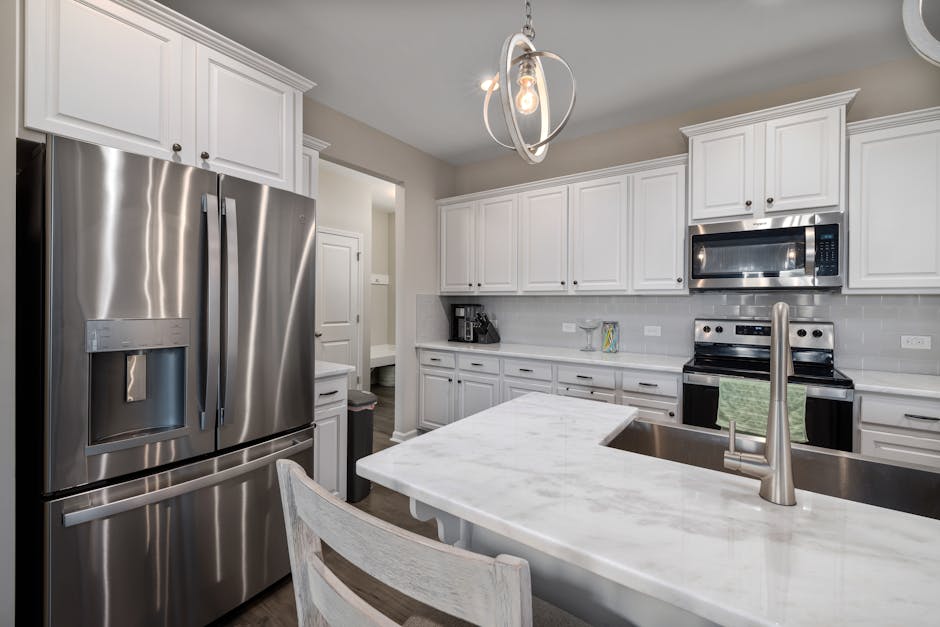
Your Guide to a Stress-Free, Sustainable Cleaning Schedule (That Actually Works!)
Life in Castle Rock and the Denver Metro area is busy. Between work, family, and enjoying the Colorado lifestyle, finding time and energy to keep your home consistently clean can feel like another impossible task on an already overflowing plate. If you've ever felt overwhelmed by the sheer amount of cleaning needed or struggled to maintain a tidy space week after week, you're not alone.
Our founder, a working mother of two right here in Colorado, understood this struggle firsthand. That's why Snow Maids was created – to help busy individuals and families find peace of mind in a clean environment. But what if you want to tackle some of the cleaning yourself and just need a system?
That's where a sustainable cleaning schedule comes in. It's not about spending hours every day scrubbing, but about creating simple habits and routines that make consistent cleanliness achievable. Think of it as a roadmap to a less stressful, more organized home – an essential part of creating an environment where you can truly thrive. This guide is part of understanding how small, consistent actions can transform your home environment, linking to the broader idea of managing your space effectively for well-being.
Why Bother with a Cleaning Schedule?
You might think scheduling cleaning sounds rigid or unnecessary, but having a framework offers significant benefits:
- Reduces Overwhelm: Instead of facing a mountain of tasks on a Saturday, you break it down into manageable chunks throughout the week. This prevents that feeling of "where do I even start?"
- Saves Time & Energy: Consistent, smaller efforts prevent dirt and clutter build-up, making cleaning sessions quicker and less strenuous in the long run.
- Improves Mental & Physical Well-being: A clean environment has been shown to reduce stress and anxiety, improve focus, and cut down on allergens and germs.
- Creates Consistency: It helps ensure that important tasks don't fall through the cracks for weeks or months.
- Promotes Fairness: If you live with others, a schedule can clarify responsibilities and ensure everyone contributes.
Common Hurdles: Why is Sticking to a Schedule So Hard?
Let's be honest, life happens. Schedules can feel restrictive, and motivation waxes and wanes. Common reasons people struggle include:
- Lack of time (or perceived lack of time)
- Feeling overwhelmed by the idea of creating one
- Inconsistency due to unpredictable schedules or energy levels
- Forgetting what needs to be done
- Lack of motivation or finding cleaning boring
- Simply not knowing where to start or how often things need cleaning
Understanding these challenges is the first step to building a schedule that actually works for your life. The key isn't perfection; it's consistency and flexibility.
Building Your Sustainable Schedule: The Flexible Framework
The most effective cleaning schedule isn't a one-size-fits-all template from the internet. It's one you create based on your home, your lifestyle, and your priorities. Here’s a simple framework:
Step 1: Assess Your Needs & Home
Walk through your home. What areas get messy fastest? What tasks do you hate doing? How much time realistically can you dedicate each day or week? Consider the size of your home, who lives there (pets, kids?), and how much traffic each area gets.
Step 2: List Your Tasks
Write down every cleaning task you can think of, room by room. Be comprehensive initially – you'll break it down later. Don't forget often-missed items like wiping baseboards, cleaning light fixtures, or vacuuming under furniture.
Step 3: Decide on Frequency
Now, assign a frequency to each task:
- Daily: Quick tasks that maintain baseline tidiness.
- Weekly: More thorough cleaning of main areas.
- Monthly: Deeper cleaning tasks.
- Seasonally/Annually: Big projects like deep cleaning appliances, washing windows, or organizing cluttered spaces.
Your Daily & Weekly Cleaning Routines (Core Tasks)
Let's look at typical tasks broken down. Remember, these are starting points – customize them to fit your home!
Daily Habits (Think 15-30 minutes total):
These are quick hitters that prevent clutter from taking over. Focus on high-traffic areas.
- Make your bed.
- Wipe down kitchen counters and sink after meals.
- Do a quick sweep or vacuum of the kitchen floor.
- Tidy up the main living area (fluff pillows, fold throws, put items away).
- Deal with mail/paperwork immediately.
- Quick bathroom wipe-down (sink, counter).
Weekly Tasks (Can be spread out or tackled in longer blocks):
This is where you give your home a more thorough clean. You can assign tasks to specific days (e.g., "Tuesday is Bathroom Day") or clean zones ("Upstairs on Wednesday, Downstairs on Thursday").
- Clean bathrooms thoroughly (toilet, shower/tub, floor, mirrors).
- Vacuum/sweep all floors.
- Mop hard floors.
- Dust furniture and surfaces.
- Wipe down kitchen appliances (outside).
- Clean mirrors.
- Change bed linens.
Helpful Tip: Many people find visual aids like checklists or printable templates incredibly useful for tracking daily and weekly tasks. Resources are available from many cleaning experts and sites that offer templates you can customize.
Making it Stick: Strategies for Success
Creating the schedule is one thing; integrating it into your routine is another.
- Start Small: Don't try to do everything at once. Begin with just the daily tasks for a week or two to build momentum, then add weekly tasks gradually.
- Time Block: Allocate specific, short amounts of time for cleaning. Even 15-20 minutes focused on one task (like cleaning one bathroom) is effective.
- Tie to Existing Habits: Try to clean the kitchen counters immediately after dinner cleanup, or tidy the living room before you relax in the evening.
- Be Flexible: Life happens. If you miss a day or a task, don't dwell on it. Just pick up where you left off or adjust your schedule for the week. These are "grace days," not failures!
- Break Tasks Down: If "Clean the Bathroom" feels overwhelming, break it into smaller steps: "Clean the toilet," "Wipe the counter," "Clean the mirror," "Sweep the floor."
- Use Music or Podcasts: Make cleaning more enjoyable.
- Track Your Progress: Seeing what you've accomplished can be motivating.
Adapting Your Schedule to Your Life
Your schedule needs to serve you, not the other way around.
- For Busy Professionals: Focus on ultra-short daily tasks (5-10 mins) and dedicate slightly longer blocks (30-60 mins) on weekends or one evening. Delegate or consider professional help for less frequent deep cleans.
- For Families with Kids: Involve children in age-appropriate tasks. Make it a game. Focus on high-clutter areas like toy zones and entryways. Accept that with kids, "clean" might look different than "spotless."
- For Irregular Schedules: Instead of assigning tasks to specific days, assign them to specific states or blocks of free time. For example, "On my first day off, I'll do the weekly bathroom clean." Or use a checklist and tick off tasks whenever you have a free 15-30 minutes.
- For Those with Limited Mobility or Energy: Focus on critical health and safety tasks first (kitchen sanitation, bathroom). Break tasks into very small, manageable steps with rest breaks. Use ergonomic tools. Don't hesitate to ask for help from family or consider professional cleaning services for tasks you cannot manage.
Beyond Weekly: Monthly & Seasonal Tasks
Your sustainable schedule should also include less frequent tasks:
- Monthly: Clean washing machine, clean dishwasher, wipe down baseboards, vacuum upholstery, clean mirrors and glass throughout the house.
- Seasonally: Clean windows, deep clean carpets/rugs, clean oven, organize specific cluttered areas (garage, pantry), clean out gutters (exterior, but part of home maintenance).
These can be assigned to a specific weekend each month or season, or spread out as one "extra" task per week.
Putting it All Together: Creating Your Routine
Take your lists, decide on frequencies, and start blocking out time – either on a calendar or simply by creating a checklist you work through. Remember to be realistic about the time you have. It’s better to start with a few tasks you can consistently manage than create an exhaustive list you'll abandon.
The goal isn't a show home every single day, but a consistently cleaner space that reduces stress and allows you to enjoy your home more.
Conclusion
Creating and maintaining a cleaning schedule is a powerful tool for managing your home and your well-being. It takes effort and consistency, but the rewards – reduced stress, more free time, and a comfortable living environment – are well worth it. Start small, stay flexible, and find the rhythm that works best for your busy life.
And remember, for those times when the schedule isn't enough, or you need a helping hand for the deeper tasks, professional cleaning services like Snow Maids are here to provide that peace of mind and help you get back on track.
FAQs
Q: How long should my daily or weekly cleaning take?
A: It varies based on your home size and your habits, but aiming for 15-30 minutes of focused daily tasks and 1-3 hours of weekly tasks (which can be split up) is a realistic starting point for many households. Consistency is more important than duration.
Q: What if I miss a day or a whole week?
A: Don't worry! This is normal. Just pick up where you left off the next day or the next week. Don't try to catch up on everything at once, which can lead to burnout. Adjust your schedule for the current week if needed.
Q: How do I get my family members involved in the schedule?
A: Make it a joint effort. Discuss the schedule together, assign age-appropriate tasks, and be clear about expectations. Visual checklists can help everyone see what needs to be done. Lead by example and praise contributions.
Q: Should I clean everything on one day or spread it out?
A: It depends on your preference and schedule. Some people prefer dedicating a few hours on one day ("Cleaning Day"), while others prefer spreading tasks throughout the week ("Little and often"). Experiment to see what feels most sustainable for you.
Q: What's the difference between regular cleaning and deep cleaning?
A: Regular cleaning (like your daily/weekly schedule) maintains cleanliness. Deep cleaning is more intensive, reaching hidden dirt and grime (e.g., cleaning inside the oven, scrubbing grout, washing blinds). These are typically done monthly or seasonally. Snow Maids offers dedicated deep cleaning services for when you need that extra level of clean.


Customer Testimonials
"Katy is always amazing. Next time, however, I would prefer she knock on my office door to let me know she is ready to clean my office before she goes. Thank you!"
"Amazed by their service! House looked amazing and immediately planned on scheduling a future cleaning. Estimate process and scheduling was very easy - they were available quickly to do a deep clean. You can tell they put effort into their work and the results showed. Thanks so much for a clean house!"
"Did a deep clean with Snow Maids and it was amazing sight to come home to. Can't wait to have them clean our home regularly to keep up with the day to day grind. Their team did a great job and worth it so much!"















